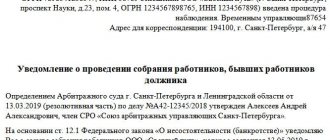Features of declaring bankruptcy after death
Cases where creditors demand that heirs repay the debts of a deceased relative are not uncommon in modern judicial practice. At the same time, when filing a claim, the creditor does not have complete information about the composition of the inheritance mass and the number of creditors.
In many cases, it is difficult and even impossible to satisfy the requirements due to the uncertainty of the cases. The courts of the Russian Federation are not always ready to consider bankruptcy applications of deceased persons, since such cases are strictly regulated.
The court must establish:
- who is included in the number of heirs;
- what is included in the hereditary mass;
- how much the property is actually worth;
- what debts and in what volume remained with the deceased.
Important! Any doubts and uncertainties become the reason for refusal to satisfy the creditor's claim, and the case for declaring insolvency often reaches a dead end.
Inheritance administrator in case of bankruptcy of the testator
If the inheritance itself is not enough to satisfy the claims of all creditors, the bankruptcy procedure makes it possible to avoid problems. The entire hereditary mass comes under management.
In accordance with the Bankruptcy Law, an estate manager is appointed.
The manager is faced with the task of selling the property in such a way as to satisfy the demands of creditors and pay them as much as possible (Article 223.1 of the Bankruptcy Law of October 1, 2015).
How are the debts of a deceased person inherited?
Bankruptcy after death without a will is no different from cases of inheritance under a will. According to legislative acts, the heir cannot accept the inheritance in parts , renouncing, for example, the debts of the deceased: he accepts the entire estate together with debt obligations.
the principle of joint liability is applied to all heirs (Article 323 of the Civil Code of the Russian Federation). An inheritance can be accepted in fact if at the time of death the heir lives together with the deceased and pays for his maintenance and utilities.
Issuance of a certificate of inheritance
If the heir lives separately from the deceased owner of the inheritance, a certificate of the right of inheritance is issued only by a notary.
In this case, the notary is not obliged to indicate a complete list of property (Article 1162 of the Civil Code of the Russian Federation).
When registering an inheritance, it is difficult to take into account all objects, although notaries require a complete list of property and include it in the certificate. Sometimes they indicate the size of the heir's share without specifying what it includes. If any object of inheritance appears later, a new certificate may be issued for it.
Who can initiate bankruptcy?
In accordance with the insolvency law, a deceased citizen can file a bankruptcy petition:
- heir who has entered into inheritance rights;
- any bankruptcy creditor;
- government body to which the deceased had an outstanding debt.
You need to know: What will happen to the wife’s property if the husband goes bankrupt
Will in case of bankruptcy of the heir
Situations arise when a deceased citizen bequeaths his property to a relative who is declared bankrupt. When making a will in bankruptcy, the heir has no restrictions on entering into an inheritance.
The procedure for declaring the recipient of property insolvent is not resumed, and the received property is not included in the bankruptcy estate.
The heir accepts the debts of the deceased in an amount not exceeding the market value of the property on the day the inheritance is opened. If a dispute over the debts of the deceased lasts for several years, the amount of the debt, even if market prices change, remains in its original form.
All claims of creditors are included in the queue, they are satisfied proportionally in order to exclude cases of advantage of one debt over others. A notary may know about the debts of the deceased, but it is not his responsibility to notify any of the creditors, or indeed to take initiative in this matter.
Important! The law does not require the mandatory initiation of bankruptcy proceedings. It is opened at the request of one of the parties to the case or government agencies.
Bankruptcy of the estate. State of Russian law and development prospects
On October 1, 2015, Art. 223.1 of the Law “On Bankruptcy” (currently this article is in force as amended by Federal Law No. 391-FZ dated December 29, 2015). The legislator has provided that the death of a debtor is not grounds for terminating bankruptcy proceedings. But the greatest interest is caused by the possibility of initiating bankruptcy proceedings against a citizen after his death.
The idea of a citizen's bankruptcy after his death is the separation of property, through which the testator's creditors can satisfy their claims. We can call this a conditional personification of the hereditary mass. When such an “entity” is insolvent, the fairest way to satisfy the claims of its creditors is through bankruptcy.
A bankruptcy case allows you to challenge transactions to the detriment of creditors and transactions with preference made by the testator and heirs, as well as to achieve proportional satisfaction of the creditors of the inheritance, taking into account the rules of seniority.
Inheritance bankruptcy is present in foreign countries.
Despite the serious changes to Article 223.1, adopted two months after it came into force, the legislator left a number of questions. Some of the problems that are not reflected in the literature are proposed to be discussed .
1. Insolvency of the inheritance.
The bankruptcy of an inheritance in the title of § 4 of Chapter X is designated as a special case of bankruptcy of a citizen. The condition for initiating bankruptcy proceedings against a citizen is proven insolvency (clause 2 of Article 213.6). The concept of insolvency of a citizen (clause 3 of Article 213.6) is less strict compared to the general concept of insolvency (Article 2). Should the insolvency of a deceased citizen be established in the event of bankruptcy of an opened inheritance? The current version of Article 223.1, unlike the previous version, does not refer to the rules of Chapter X (“Bankruptcy of Citizens”). Perhaps the legislator realized that the bankruptcy of a deceased citizen is the bankruptcy of separate property.
That is, at present, when a bankruptcy case is initiated against an inherited estate based on a creditor’s application, insolvency according to the rules of clause 3 of Article 213.6, and especially the insufficiency of property, is not established. The heirs who accepted the inheritance have the right to file an application for bankruptcy of the inheritance in the event of foreseeing failure to fulfill the obligations of the testator at the expense of the inherited property. Russian law does not impose obligations on the heirs to initiate bankruptcy proceedings against an inheritance.
2. Creditors in a bankruptcy estate case.
The simplest and most common situation is when the testator made a delay. The situation is more complicated if the deadline for execution occurs after the opening of the inheritance[ii]. Let’s say that during his lifetime the testator regularly repaid the loan at the expense of his income, or the testator was a guarantor, and the default of the main debtor occurred after the opening of the inheritance. The moment of maturity does not affect the qualification of the debt. In any case, these are the debts of the testator.
It is important to note that in the event of bankruptcy of an inheritance, claims and debts between the testator and heir, which were terminated by the coincidence of debtor and creditor in one person, are restored.
In addition to the testator's creditors, there are so-called inheritance creditors, whose claims arose after the opening of the inheritance. This includes demands for payment for funeral services, expenses for the protection and management of property, and the demands of legatees appointed by the testator, which are satisfied within the limits of the value of the inheritance remaining after settlements with creditors. It appears that legatees, the execution in whose favor depends on the net asset of the estate, are forgotten by the legislator and deserve the right to participate in the bankruptcy case.
Capitalization of payments for compensation for damage to life and health, which is not made during the bankruptcy of a citizen, is mandatory in the bankruptcy of the estate. The issue of granting creditors for obligations resulting from harm to life and health the right to initiate bankruptcy of the inheritance needs to be discussed. In the absence of such a right, their interest may be seriously harmed if the heirs, for example, prefer to satisfy the claims of previously applied creditors and reach the limit of liability.
3. The impact of opening an inheritance on debt.
The claims of creditors in the part exceeding the value of the inherited estate are qualified by judicial practice as terminated by the impossibility of fulfillment (clause 60 of the Resolution of the Plenum of the Armed Forces of the Russian Federation dated May 29, 2012 No. 9). This decision cannot be called successful, since it does not explain why, regardless of the completeness of the inheritance, the collateral provided by a third party and guarantees are retained (clause 4 of Article 367 as amended on 03/08/2015), depriving creditors of the opportunity to initiate bankruptcy of the inheritance. There is reason to argue about the need to award the entire amount of the debt to the testator's creditor, indicating that recovery from the heir is made within the value of the inheritance.
4. Bankruptcy of the inheritance vs bankruptcy of the heir.
To file for bankruptcy, the creditor, as a general rule, must first obtain a court order to collect the debt. A court decision to collect a debt from an heir should not prevent the estate from going bankrupt. The creditor of the estate has a choice - to continue to pursue the heir to the extent of the value of his inheritance share or to initiate bankruptcy of the estate and try to collect the entire amount of the debt.
Does the testator's creditor have the right to initiate bankruptcy of the heir? Complex issue. It seems that yes, since the inherited asset and liability (or part thereof) are dissolved in the property of the heir. However, in this case, the creditor will have to prove the insolvency of the heir according to the rules of paragraph 3 of Article 213.6 (for example, a wasteful heir squandered everything).
An heir who has accepted an inheritance burdened with debts that will be difficult to pay off on time due to the composition of the inheritance mass has the right to initiate bankruptcy of the inheritance. Due to the limited liability limit, inheritance debts usually do not cause the heir to become insolvent. However, as already mentioned, the heir may turn out to be wasteful, and there are situations where the asset depreciates (the shares owned by the testator have seriously fallen in price). In the event of his own insolvency, the heir has the right to file an application for bankruptcy of a citizen, although, from the point of view of preserving personal property, as a rule, it is more profitable to declare bankruptcy of the inheritance. The Russian legislator has not provided any deadlines for initiating bankruptcy of an inheritance (separation after a long time is difficult).
Bankruptcy of an inheritance means that the creditors of the inheritance lose the opportunity to be satisfied at the expense of the heir; all of them, under penalty of loss of rights, must be included in the register of creditors of the inheritance. If the heir’s bankruptcy occurs at the same time, then the testator’s creditors are apparently subject to exclusion from the register of the heir’s creditors.
5. Responsibility of the heir to the estate.
Under the universal succession model, the heir takes the place of the testator in the obligations capable of succession. But this rule should not be understood literally, in the sense that no matter how the heir behaves, the amount of his responsibility is always limited by the value of the inheritance. It can be said that when choosing separation, the heir, in relations with creditors, acts as a representative of the estate and is obliged to compensate for losses caused to the inheritance by his unreasonable or dishonest behavior.
6. Debt restructuring.
The current version of Article 223.1 excludes the debt restructuring procedure. The court immediately enters into the sale of property or proceeds to the sale of property when the debtor dies during the bankruptcy process. It seems that everything is logical, the debtor is no longer alive, which means there is no one to feel sorry for, the composition of the property, the value of which determines the limit of liability, has been finally formed. Maybe it’s worth pitying the heirs who want to keep the inherited property? The conclusion of a settlement agreement between creditors and heirs who accepted the inheritance is possible (according to the meaning of the law, apparently, after the final determination of the circle of heirs). The settlement agreement makes the heirs' liability complete, so they will subsequently not be able to rely on reaching the limit of liability.
Often, the inherited property that the heirs want to keep turns out to be housing purchased by the testator using loan funds. The pledge excludes immunity from foreclosure. Statistics show that the debtor has little chance of restructuring in such a situation. Apparently the chances of concluding a settlement agreement are even less.
7. Final remarks.
It was not possible to find an answer to the question of why the determination on the completion of the sale of property is not subject to revision in the event of the discovery of hidden items from the inheritance mass.
It is also difficult to explain why the new version of Article 223.1 believes that the executor appointed by the testator is not suitable for the role of a person representing the estate during the period of exercising his powers.
Using the term “term for acceptance of inheritance,” the legislator apparently meant six months from the date of opening of the inheritance. However, the current deadlines for accepting an inheritance can be much longer. Based on the explanation contained in the last paragraph of paragraph 35 and in the last two paragraphs of paragraph 38 of the Resolution of the Plenum of the Armed Forces of the Russian Federation of May 29, 2012 No. 9, a special period is granted to each subsequent group of called-up heirs. For example, if there are the first seven lines of heirs and each of the called lines does not accept the inheritance, the cumulative period will be 24 months. If each time the heir of the “senior” line refuses the inheritance on the last day of the term, then in the example given the cumulative period will be 42 months. If one son of the testator does not accept the inheritance, and the second refuses in favor of his uncle (the testator’s brother), then the uncle called to inherit will have two terms in relation to each share. It would be more correct, I think, to allow heirs to participate in the bankruptcy case immediately after accepting the inheritance (an application to join the case can be considered as an act of acceptance).
There are no detailed studies on this topic in domestic doctrine. Among the publications we can name: Ostanina E.A. Bankruptcy of the inherited estate: analysis of changes in legislation // Inheritance law. 2015. No. 4. P. 33 - 38. Petrov E.Yu. Responsibility of the heir for inheritance debts. On Sat. Current issues of inheritance law / Yu.B. Gongalo, P.V. Krasheninnikov, I.B. Mironov and others; edited by P.V. Krasheninnikova. M.: Statute, 2021. Komissarova E.G., Permyakov A.V. Evolution of creditor rights in relations with heirs who accepted the inheritance // Bulletin of Perm University. Legal sciences. 2021. N 2. P. 185 - 192. Kazantseva A.E. On the compliance of the provisions on the bankruptcy of a deceased citizen with civil legislation // Notary. 2021. N 3. P. 8 – 10; Shishmareva T.P. Problems of insolvency of separate property masses // Business Law. Application "Law and Business". 2021. N 3. P. 50 - 54.
[ii] According to paragraph 61 of the Resolution of the Plenum of the Armed Forces of the Russian Federation dated May 29, 2012 No. 9, “for the period necessary to accept the inheritance, the heir is released from liability for failure to fulfill the obligations of the testator: interest payable in accordance with Article 395 of the Civil Code of the Russian Federation is charged for failure to fulfill a monetary obligation by the testator on the day of opening of the inheritance, and after the opening of the inheritance for failure to fulfill a monetary obligation by the heir, within the meaning of paragraph 1 of Article 401 of the Civil Code of the Russian Federation, after the expiration of the time necessary for acceptance of the inheritance.” It appears that there is no delay during the moratorium period, which prevents the initiation of bankruptcy proceedings
Who initiates bankruptcy proceedings after the death of the testator?
The positive side of the bankruptcy procedure for inheritance recipients is that only those creditors whose obligations to whom arose during the inheritance participate in it.
Bankruptcy of an estate is usually initiated by:
- creditors of a deceased citizen;
- government agencies (for example, tax office);
- other heirs.
In practice, the heirs, after it turns out that there are more debts than property, prefer to distance themselves from the procedure, since they will not get anything from the inheritance anyway. It is possible to challenge, by declaring insolvency , some transactions signed by the deceased. In these cases, the heirs may initiate bankruptcy.
Creditors do not always require bankruptcy proceedings because they do not have the information to do so. The necessary information is available from a notary, a court, or a bailiff, but they are not supposed to take the initiative and provide information on the case to interested parties.
Bankruptcy before and after death: nuances of timing
If a citizen dies during the bankruptcy process, all previous actions are terminated. In this case, the citizen is immediately declared insolvent, and the court orders the sale of the property. When a citizen was declared bankrupt before death, the opening of an inheritance case by the financial manager is carried out by contacting a notary.
Important! This must be done within 5 days from the date of establishment of the fact of death.
Bankruptcy of a deceased individual
Completion of the bankruptcy procedure of a deceased citizen is necessary, first of all, for his creditors who did not manage to receive payment for their existing obligations. Despite the fact that Art. 1175 of the Civil Code of the Russian Federation on the succession of heirs protects the rights of creditors; the legislator decided to provide the latter with a choice of 1 of 2 options for collecting debts after the death of the debtor:
Free legal consultation We will answer your question in 5 minutes!
Ask a Question
Free legal consultation
We will answer your question in 5 minutes!
Ask a Question
- Creditors wait until the heirs receive the inheritance and pay them off within the limits of the inheritance mass transferred to them.
- Creditors file bankruptcy proceedings against the deceased person.
This is also important to know:
Bankruptcy of an individual entrepreneur with debts: conditions and timing of the procedure
What is common in both cases is that debts can only be recovered to the extent of the value of the inherited property.
The advantages of the bankruptcy procedure over the general procedure for collecting debts from heirs are:
- the opportunity to submit an application without waiting for the expiration of 6 months, which are necessary to accept the inheritance;
- absence of a restructuring stage, since the process begins with the sale of the property of the deceased;
- fixed, i.e., independent of the value of property or the amount of debt, the amount of state duty (300 rubles for citizens, 6 thousand rubles for organizations);
- lack of deadlines for filing a bankruptcy claim after the death of a citizen, impossibility of applying the consequences of missing the statute of limitations.
In addition, if the insolvency procedure was started before the death of the citizen, then it continues.
Who is the defendant
The defendants are the heirs.
But it is worth keeping in mind that they do not spend their own funds in the process. That is, they are responsible to the creditors of the bankrupt exclusively with the funds of the deceased, losing nothing except their own time and nerves - after all, proceedings can last for years. The question is - why do the defendants need all this? Why would they carry a debt burden that they inherited from a bankrupt relative?
If all property and securities that were inherited are subject to sale within the framework of bankruptcy proceedings, then it makes no sense to get involved in such a matter. After the death of a citizen, his property, rights and obligations are transferred to his heirs exclusively on a voluntary basis. No one has the right to impose all this on them. If you think that you will get nothing but a headache, feel free to refuse the role of heir, relieving yourself of the obligation to act as a defendant.
Powers of a notary when considering a bankruptcy case after death
If in a bankruptcy case of a living citizen the main role is assigned to the bankruptcy trustee, then in the event of the death of a bankrupt or a contender for this title, all the reins are transferred to the hands of a notary.
This is also important to know:
How bankruptcy of a non-profit organization with debts is carried out
It contains the following functions:
- Provide a copy of the inheritance file to the court so that during the bankruptcy hearing the heirs of the deceased are recognized as persons entitled to take part in the case.
- Until the heirs enter into the inheritance (which is possible only after the expiration of the period specified in Russian legislation), the notary participates in the case of declaring a citizen bankrupt posthumously.
- The notary prepares and submits to the court a petition for the sale of bankruptcy property.
- Exchanges information about the deceased's property with the financial manager.
The financial manager notifies the notary about the death of a citizen within five days from the moment of its official recognition.
Information about bankruptcy property that was not sold is also transferred to the notary.
Sequence of requirements satisfaction
The law talks about the procedure for satisfying the claims of creditors and those persons to whom the deceased bankrupt owes money.
Thus, notary costs, current expenses for the burial of the deceased, and the costs of protecting the inheritance are paid out of turn.
Further, if the person’s insolvency has been recognized, the following requirements are satisfied:
- For payment of alimony,
- For legal expenses in a bankruptcy case of an individual,
- To pay for the work of the financial manager and the persons hired by him to ensure his duties.
- Benefits and salaries for employees who worked for the deceased.
- Utility bills.
- Other current payments.
- Payments to citizens whose life or health the bankrupt caused harm.
Those creditors who owned the citizen’s collateral property are allocated 80% of its value following the sale. Another 10% goes to repay the citizen’s debts to other creditors if no more of his property could be sold or the proceeds were not enough to cover the debt. The remaining 10% goes towards paying legal fees and paying the financial manager.
This is also important to know:
Arbitration managers for bankruptcy of legal entities
If there is not enough property to satisfy any requirements, they are written off and considered repaid.







